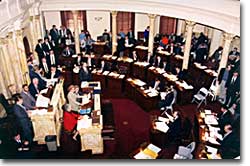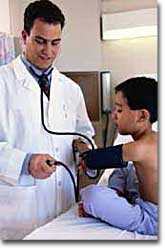12a. State and Local Governments: Democracy at Work?

Although their composition and rules may vary from state to state, state legislatures have a common function: to propose legislation and enact laws that apply to their state. Here, the New Jersey State Legislature is hard at work.
One national government, 50 state governments, and 85,000 local governments.
The vast majority of government employees work for local and state — not the federal — governments. Teachers, policemen, clerks at the motor vehicle office. Many of these people are state and local employees. This seems to confirm the general notion that government is in fact "closer to the people," and therefore more democratic. But the real evidence is contradictory.
Who Holds State and Local Power?

Waste management is a sensitive issue that often stirs local residents to political action. Concerned citizens in Dayton, Ohio, called for a boycott of Waste Management, Inc. when the company refused to clean up a landfill to the satisfaction of nearby residents.
Governors, legislators, and many other elected officials lead state governments, and judges sit on both state and local courts. Local officials include Mayors, City Council members, City Planning Commissioners, and school board members. Many local officials are nonpartisan. In other words, they do not run for election to office with a party label, but on their own good name. Often these individuals cross register themselves in both political parties.
Social scientists have studied power in communities and have found some contradictory evidence. Several have found a relatively small and stable group of top policy makers, many of whom are local businesspeople. Others have concluded that while some people had a great deal of local influence and most others had little, still there was no permanent "power class," in local politics.
Participation in State and Local Politics

Several states have taken steps to regulate and oversee managed health care within their own borders so that their residents can navigate the often confusing world of health insurance with less difficulty.
How interested are Americans in their local political affairs? What about citizen participation — voting, attending meetings, phoning officials, and keeping up with local politics? Citizens generally take less interest in and are less informed about their local governments than they are about the national government. Percentages of eligible voters who actually vote in presidential elections have been hovering around 50 -60% in the past few elections. Local elections draw far fewer voters, with some school board and city council members elected with 10-15 percent of the eligible voters. Why the dramatic difference, if they are so close to the people?
Some of the reasons are understandable. After all, local governments in particular are preoccupied with relatively non-controversial routines, such as providing fire and police service, attracting businesses that can create more jobs, and keeping the roads in shape. People tend to let them do their jobs until something happens that directly affects their lives. For example, people often get involved when a landfill company or a drug rehabilitation center buys the property next to theirs, or when a house down the street is robbed.
But the participation rates tend to bear out the fact that most people have very little interest in local politics. Still, many of the burning issues of modern times are also state and local concerns. People need protection from crime and violence, and they depend on state and local officials for that. Drugs, gangs, racism, and poverty confront governments on every level. Education, preservation and protection of the environment, and health care delivery all cry out for active participants to solve their problems. All across the United States, thousands of political activists are making the attempt, but a democracy needs all its citizens.







